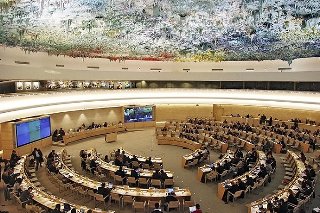Lebanon under Universal Periodic Review

In March 2015, Habitat International Coalition-Housing and Land Rights Network (HIC-HLRN), joined with the Arab NGO Network for Development (ANND) and other Lebanese NGOs to submit a joint comprehensive parallel report for the second review of the Republic of Lebanon before the UN Human Rights Council’s Universal Periodic Review (UPR) mechanismlater this year.
For its part of the collective report, HIC-HLRN reviewed the performance of the Lebanese state in respecting, protecting and fulfilling its obligations under Article 11 of the International Covenant on Economic, Social and Cultural Rights. The HIC-HLRN contribution covered three main issues:(1) the human right to adequate housing, (2) water privatization policies affecting the human right to water and (3) the impact of government practices in land management and land tenure.
The report highlighted the negative impacts and violations associated with the policies and laws privatizing water resources, and the human rights consequences of urban-renewal projects in the City of Beirut. One of these policy instruments is a set of Laws 159/92 and 160/92 by the parliament council that, in April 2014, regulated the lease or acquisition of residential units. Application of this new law can lead to displacement and eviction around 200,000 poor families and vulnerable groups living in the capital city, specifically, 53% of urban residents in Lebanon are living in informal areas.
The joint report also reviewed the internal displacement and loss of property affecting the 20,000 Palestinian refugees who fled from Naḥr el-Bārid Camp in 2007. They are mostly still living in congested conditions in the surrounding areas around Tripoli.
Also, the UPR submission noted the continued suffering of Palestinian refugees from restrictive Lebanese government policies, isolating them from the wider Lebanese community and economy. The report noted that these measures breach paragraph B of the preamble of the Lebanese Constitution, Article 13 of the Refugee Convention (1951) and Article (2) of the International Convention on the Elimination of All Forms of Racial Discrimination.
The report noted that, although Decree Law No.144/1925 considers water resources as public domain, the Lebanese government has no public policy or unified legislation to regulate the management of water resources. However, the government has allied with a group of business men since 2013 to pursue its “Blue Gold” campaign and create the National Water Council, which maintains an equal number of public-sector and private-sector representatives. The project aims to transfer not only the responsibilities of water-sector operations and maintenance, but also the water resources themselves, to the private sector. That process will transform the country’s water from social good to be merely an economic commodity for profit and affect the right of the poor and vulnerable groups to access water, at increasing cost, while subjecting the criteria for quality and distribution to private interests.
This pattern began with the Ministry of Energy and Water’s Law No. 221 in 2000, without consideration of the social dimension of public water. TheLebanese government then engaged the French private-sector company Ondeoto to manage the water resources in North Lebanon under a four-year contract in 2002. That process cancelled the role of municipalities and civic structures formerly responsible for managing the water resources in the region. In a separate arrangement, the Government of Lebanon (GoL) took out loans on the private financial market (from SociétéGénéral) for €20 million, in order to privatize the water in Akkar, north Lebanon. Then the GoL transferred all water services to the French company, which collected €9 million in management fees (45% of the loan). In addition to these financial payments, the Lebanese public also incurred the interest on the bank loan. The privatization of the entire water sector in Lebanon has replicated this pattern.
The joint report also raised the human rights dimensions of the random use of land and the high registration and transaction costs that have accompanied the loss of vital agricultural land to urban development. This process has opened the way to land speculation for quick and easy profits. Foreign entities have dominated the land market by driving up land prices and purchasing land for real-estate development, limiting access to land for most Lebanese.
The joint report included recommendations to the Lebanese government and the Human Rights Council consistent with the state’s obligations to respect, protect and fulfill economic, social and cultural rights. The organizations called for a human rights approach to the management of public goods and services to ensure equitable access.
The joint report of stakeholders on Lebanon forms part of a wider effort to promote greater attention to economic, social and cultural rights (ESCRs) in the UPR review processes; whereas, states largely have overlooked crucial ESCRs in review of countries where economic policies have led to obvious violations. Lebanon will come before the Human Rights Council for its full review during the 23rd UPR session, on 2 November 2015.
Download a copy of the joint report.
|